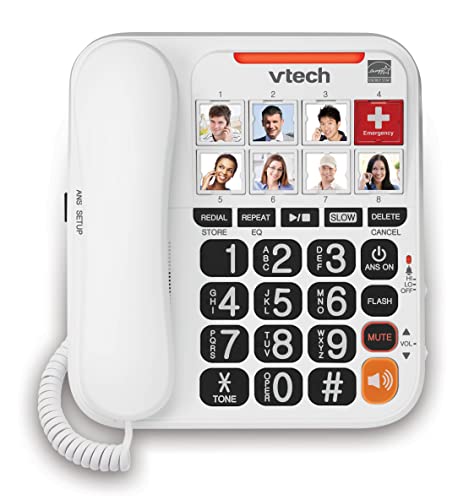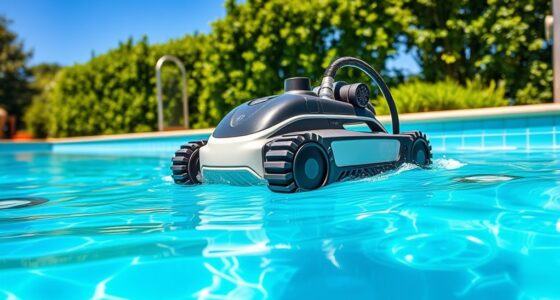I’ve found the 15 best phones for seniors that offer user-friendly features for effortless communication. Models like the SMPL Landline Phone and VTech SN5147 stand out with their large buttons and photo memory dialing. The AT&T BL102-2 is great for its smart call blocker. Each phone caters to varying needs, ensuring ease of use for seniors. Stick around to discover more about these fantastic options and their unique features that make communication simpler.
Key Takeaways
- Look for phones with large buttons and high-contrast displays to enhance visibility and ease of use for seniors.
- Opt for models with photo memory keys for quick dialing to simplify communication with family and friends.
- Choose devices with amplified sound options and adjustable volume settings to cater to hearing impairments.
- Consider phones with emergency features like SOS buttons to ensure quick access to assistance when needed.
- Ensure compatibility with existing services and check for straightforward setup instructions to facilitate user independence.
SMPL Landline Photo Memory Big Button Phone for Seniors
The SMPL Landline Photo Memory Big Button Phone stands out as an excellent choice for seniors, particularly those dealing with cognitive decline or dementia, because it features six photo memory keys that allow for quick dialing with just a press of a button. I love how the large buttons make dialing simple, and the amplified sound guarantees I never miss an important call. The visual flasher is a thoughtful touch, enhancing call awareness. Plus, it works during power outages, which gives me peace of mind. Overall, it’s a reliable option for anyone wanting to stay connected effortlessly.
Best For: Seniors, especially those with dementia or cognitive decline, looking for a simple and reliable communication solution.
Pros:
- Large, easy-to-press buttons make dialing simple for users with dexterity issues.
- Amplified sound ensures that important calls are heard clearly, with adjustable volume options.
- Photo memory keys allow for quick dialing by associating contacts with images, improving ease of use.
Cons:
- Some users report volume resetting issues and reliability concerns after extended use.
- The wall mount design may not fit all common telephone jack profiles, causing installation challenges.
- Lack of a true speakerphone feature could limit hands-free calling options.
AT&T BL102-2 DECT 6.0 Cordless Phone with Answering Machine
For seniors seeking simplicity and reliability, the AT&T BL102-2 DECT 6.0 Cordless Phone stands out with its large 2-inch screen and lighted keypad. This phone features a digital answering machine that records up to 22 minutes of messages, making communication effortless. I appreciate the smart call blocker, which automatically blocks robocalls and stores up to 1,000 entries. The high-contrast text guarantees readability, while the full-duplex speakerphone enhances conversations. Although some users find the setup tricky, the clear connections and effective call screening make it a solid choice for effortless communication at home.
Best For: Seniors and individuals seeking a user-friendly cordless phone with essential features for reliable communication.
Pros:
- Large 2-inch screen and lighted keypad for easy readability, making it ideal for seniors and visually impaired users.
- Smart call blocker effectively reduces unwanted robocalls, offering peace of mind.
- Full-duplex speakerphone allows for clear conversations, enhancing overall communication quality.
Cons:
- Some users report difficulties with the setup process for the answering machine and call blocking features.
- Accessing certain functions, such as the directory and voicemail, can be complex and cumbersome.
- Mixed reviews on voice quality of the caller ID announcer, affecting overall user satisfaction.
VTech SN5147 Amplified Corded/Cordless Senior Phone
Designed with seniors in mind, the VTech SN5147 Amplified Corded/Cordless Senior Phone stands out for its oversized buttons and large display, making it incredibly user-friendly. I love the 90dB extra-loud visual ringer and the smart call blocker that keeps robocalls at bay. The photo dial feature is a game changer, allowing me to program frequently called contacts with their pictures for quick identification. Plus, the 50dB Audio Assist enhances sound clarity, which is perfect for those of us with hearing difficulties. Overall, it’s a fantastic investment for effortless communication and independence.
Best For: Seniors or individuals with hearing and visual impairments seeking an easy-to-use phone solution for communication.
Pros:
- Clear sound quality and loud ringing enhance usability for those with hearing difficulties.
- Photo dial feature simplifies calling frequently dialed contacts.
- Smart call blocker effectively reduces unwanted robocalls.
Cons:
- The cordless handset may confuse some users due to multiple buttons.
- Sound quality of the cordless handset is only deemed acceptable by some users.
- Initial programming of features may require a bit of understanding from the user.
AT&T BL102-2 DECT 6.0 Cordless Phone with Answering Machine
A standout feature of the AT&T BL102-2 DECT 6.0 Cordless Phone is its large 2-inch screen, which makes it incredibly easy for seniors to read caller information and navigate the menu. The lighted keypad is a blessing for low-light situations, ensuring dialing remains hassle-free. With a digital answering machine that records up to 22 minutes, you’ll never miss important messages. I appreciate the smart call blocker that effectively reduces those annoying robocalls. While some users find the setup a bit tricky, the overall sound quality and clear connections throughout the house make this phone a practical choice for effortless communication.
Best For: Seniors and individuals seeking an easy-to-use cordless phone with advanced call management features.
Pros:
- Large, high-contrast display and lighted keypad for easy readability and use in low-light conditions.
- Effective smart call blocker that significantly reduces unwanted robocalls.
- Digital answering machine with 22 minutes of recording capacity for important messages.
Cons:
- Some users report difficulties with setup and navigating features like answering machine and call blocking.
- Complexity in accessing certain functions, such as the directory and voicemail, can be frustrating.
- Mixed feedback on the voice quality of the caller ID announcer and overall user-friendliness.
C1+4G LTE T-Mobile Cell Phone for Seniors and Kids
The C1+4G LTE T-Mobile Cell Phone stands out as an ideal choice for seniors and kids, thanks to its user-friendly features like a big button design and an SOS button for emergencies. With its 1.8-inch color LCD and backlit keyboard, dialing and texting become effortless. I love the speed dial for quick access to contacts and the voice broadcast for time reporting. The battery lasts up to a week, which is perfect for those who might forget to charge regularly. It’s durable and designed specifically for elderly and visually impaired users, making it a reliable option for effortless communication.
Best For: Seniors and kids seeking a simple, reliable cell phone with essential features and emergency functionality.
Pros:
- User-friendly design with big buttons and a clear display, making it easy for seniors and children to use.
- SOS button allows quick access to emergency contacts for added safety.
- Long battery life, lasting up to a week without charging, which is convenient for users who may forget to charge their devices regularly.
Cons:
- Some users report a complicated setup process with limited instructions provided.
- Durability concerns have been noted, with some reviews mentioning the phone may not withstand drops effectively.
- Compatibility issues with certain networks, particularly with AT&T, may limit usability for some customers.
VTECH SN1127 Amplified Corded Answering System for Seniors
For seniors, especially those who are visually or hearing impaired, the VTECH SN1127 Amplified Corded Answering System stands out with features tailored to their needs. I love the 90dB ringer volume and 40dB audio booster, which make it easy to hear calls. The big, high-contrast buttons are user-friendly, and the photo speed dial keys let you call loved ones with a simple touch. Plus, the bright visual ringer light is a fantastic addition. With 22 minutes of recording time and slow playback, it’s perfect for those who need a little extra help staying connected.
Best For: Seniors, particularly those who are visually or hearing impaired, seeking an easy-to-use corded answering system.
Pros:
- High ringer volume (90dB) and audio booster (40dB) for enhanced hearing.
- User-friendly design with big, high-contrast buttons and photo speed dial keys.
- Digital answering system with 22 minutes of recording time and slow message playback.
Cons:
- Some users experienced challenges retrieving messages when integrated with cell phone systems.
- Limited portability due to being a corded system.
- May require initial setup assistance for those unfamiliar with technology.
Multifunctional Desktop Telephone with 9 Photo Memory Quick Dialing
Designed specifically for elderly users, the Multifunctional Desktop Telephone with 9 Photo Memory Quick Dialing makes it easy to connect with loved ones. I love that it features a photo speed dial, allowing me to simply press a picture to call family or friends. The adjustable volume guarantees I can hear every conversation clearly, and the hands-free option is perfect for multitasking. It’s lightweight and durable, making it ideal for any desk. While some users have mentioned static issues over time, I find it user-friendly and a great choice for seniors who need effortless communication.
Best For: This product is best for elderly individuals who need an easy-to-use telephone for seamless communication with family and friends.
Pros:
- User-friendly design with photo speed dial for quick access to contacts.
- Adjustable volume settings enhance clarity for users with hearing difficulties.
- Durable and lightweight construction makes it suitable for use on any desk without the risk of damage.
Cons:
- Reports of static noise and call quality deterioration after prolonged use.
- Concerns over packaging quality, with issues regarding button covers upon delivery.
- Mixed reviews on overall durability, with some users noting decreased performance over time.
AT&T CD4930 Corded Phone with Digital Answering System
When looking for a reliable phone, the AT&T CD4930 Corded Phone stands out with its user-friendly features tailored for seniors. I love how it digitally records up to 25 minutes of messages, allowing me to playback effortlessly. The backlit display and large buttons make it easy to see and use, even for those with limited vision. Plus, the hands-free speakerphone is a great addition for group calls. While it has a few limitations, like the directory size, the overall experience is positive. I appreciate its simplicity and durability, making it a fantastic option for effortless communication.
Best For: Seniors and individuals seeking a reliable, easy-to-use corded phone with essential features for communication.
Pros:
- User-friendly design with large buttons and high-contrast LCD for easy visibility.
- Digital answering system with up to 25 minutes of message recording and instant playback.
- Hands-free speakerphone feature for convenient group conversations.
Cons:
- Limited directory capacity of only 25 numbers, which may not meet modern needs.
- Directory organization is not alphabetical, making number retrieval more difficult.
- Audio assist feature must be activated for each call rather than being set as a default.
Big Button Phone for Seniors – Corded Landline Telephone
The large number buttons on the Big Button Phone for Seniors make it an excellent choice for those with visual impairments, as they greatly reduce dialing errors. I love the ergonomic foam handset cover that provides a non-slip grip, perfect for seniors like me. The memory keys are a lifesaver, allowing quick access to loved ones or emergency contacts. Plus, the amplified ringer and flashing light guarantee I never miss a call. While some users mentioned speakerphone issues, the overall performance remains reliable. With great customer support and a solid warranty, I feel confident choosing this phone for effortless communication.
Best For: Seniors and individuals with visual or grip impairments who need an easy-to-use and reliable landline phone.
Pros:
- Ergonomic foam handset cover provides a comfortable and non-slip grip.
- Large, clear number buttons enhance visibility and reduce dialing errors.
- Amplified ringer and flashing light ensure important calls are never missed.
Cons:
- Some users report low sound quality, particularly with the speakerphone feature.
- Issues with dialing out and internal capacitor failures have been reported in certain units.
- Speakerphone volume may not meet user expectations, requiring the handset to be used off the base for better sound.
Panasonic Amplified Cordless Phone (KX-TGM420W)
For seniors who struggle with hearing loss, the Panasonic Amplified Cordless Phone (KX-TGM420W) stands out as an excellent choice due to its impressive 40 dB volume boost. I love the Slow Talk feature that helps me understand conversations better, and the loud visual ringer guarantees I never miss a call. Its large backlit display and keypad make dialing a breeze, even in low light. Plus, with the option to expand up to six handsets, it’s perfect for my home. Overall, it’s user-friendly and compatible with hearing aids, making it a worthwhile investment for effortless communication.
Best For: Seniors and individuals with hearing loss seeking a user-friendly phone with enhanced sound features for clear communication.
Pros:
- 40 dB volume boost ensures conversations are loud and clear for those with hearing impairments.
- Slow Talk feature allows for better understanding of speech in real-time, enhancing communication.
- Large backlit display and keypad facilitate easy dialing, especially in low light conditions.
Cons:
- Some users report issues with headset compatibility, which may affect use with hearing aids.
- There may be instances of accidental call blocking, leading to missed important calls.
- The higher price point could be a deterrent for budget-conscious consumers.
SMPL Big Button Phone for Seniors (Model 56012)
Designed specifically for seniors, the SMPL Big Button Phone (Model 56012) stands out with its large buttons and six photo memory keys, making it incredibly user-friendly. I love how it’s compatible with both corded landlines and VoIP, providing flexibility. The adjustable volume settings guarantee clear sound, and the loud ringer and visual flasher are perfect for those with hearing challenges. While some users mention minor issues with volume resets and static, the overall feedback highlights its ease of use. With its thoughtful design, this phone truly enhances communication for seniors, offering comfort and accessibility in every call.
Best For: Seniors, elderly users, and individuals with hearing loss or cognitive decline seeking an easy-to-use phone with large buttons and visual aids.
Pros:
- Large buttons and six photo memory keys simplify dialing for seniors.
- Adjustable volume settings and a loud ringer assist those with hearing challenges.
- Visual flasher provides effective call notifications for enhanced awareness.
Cons:
- Some users report issues with volume settings resetting after use.
- Occasional static noise may occur during extended use.
- Programming instructions can be confusing, making setup challenging for some.
Serene Innovations Amplified Big Button Landline Phone for Seniors
Seniors with dementia will find the Serene Innovations Amplified Big Button Landline Phone especially beneficial. This phone features 26dB amplification and an 85dB ringer, making it perfect for those with hearing difficulties. The large buttons simplify dialing, while the nine one-touch speed dial options and photo buttons assist with memory. I appreciate that it works even during power outages, ensuring constant connectivity. Customer reviews praise its ease of use, although some mention minor static issues. Overall, I’d recommend this phone for seniors needing visual and auditory support—it’s a user-friendly option that truly enhances communication for loved ones.
Best For: Seniors with dementia or hearing impairments who need an easy-to-use phone with visual and auditory support.
Pros:
- Large buttons facilitate easy dialing for users with visual impairments.
- High amplification (26dB) and loud ringer (85dB) cater to those with hearing difficulties.
- Photo buttons assist with memory, making it easier for users to connect with loved ones.
Cons:
- Some users report static issues during calls.
- Programming speed dial numbers can be challenging and requires patience.
- No audible confirmation during programming may lead to confusion.
4G Big Button Cell Phone for Seniors and Kids
The Artfone A400 stands out as an ideal choice for both seniors and kids due to its user-friendly features, particularly the large buttons and clear display. With a 2.4-inch LCD, it’s easy to read and navigate. The 1800mAh battery guarantees long talk time, making it reliable for daily use. I love the emergency SOS button, which can reach up to five contacts, providing peace of mind. Plus, the ability to store 1,000 contacts and use speed dial simplifies communication. Overall, the Artfone A400 combines practicality and safety, making it a fantastic option for effortless communication.
Best For: Seniors and kids looking for a simple, reliable cell phone with essential features for easy communication. These devices often come with large buttons and clear displays, making them user-friendly for individuals of all ages. Additionally, many models offer features like emergency SOS buttons and hearing aid compatibility, ensuring safety and comfort for users. When searching for the best mobile phones for seniors, prioritize options that offer straightforward functionality and dependable customer support.
Pros:
- User-friendly design with large buttons and a clear 2.4-inch display for easy navigation.
- Emergency SOS button allows quick access to up to five emergency contacts for added safety.
- Long-lasting 1800mAh battery providing extensive talk and standby time ensures reliability throughout the day.
Cons:
- Limited internal storage (0.13 GB) and RAM (48 MB) may restrict the use of advanced apps and features.
- Not compatible with major carriers like AT&T and Verizon, limiting network options for some users.
- Basic camera capabilities (2MP) may not meet the expectations of users looking for high-quality photography.
Large Key Wired Telephone with Adjustable Volume
If you’re looking for a telephone that makes communication effortless for those with hearing impairments, the Large Key Wired Telephone with Adjustable Volume stands out. Its oversized keys and adjustable earpiece volume cater to seniors and those with visual challenges. I appreciate the loud ringer and the large warning light, ensuring I never miss a call. The two memory buttons are perfect for emergency contacts, allowing quick dialing. While some may find it lightweight, it’s durable and easy to set up. Overall, it’s a reliable choice for anyone needing a user-friendly phone that maintains functionality, even during power outages.
Best For: Seniors and individuals with hearing or visual impairments who require an easy-to-use telephone.
Pros:
- Oversized keys make dialing simple for those with visual challenges.
- Adjustable volume settings ensure clear sound for users with hearing impairments.
- Emergency memory buttons allow for quick access to important contacts.
Cons:
- Some users perceive the lightweight design as feeling cheaply made.
- There are concerns regarding the durability and reliability for vision-impaired users.
- Limited features compared to more advanced phone models may not meet all user needs.
Corded Phone for Seniors with One-Touch Memory Speed Dial
For those looking for a reliable way to stay connected, a corded phone with one-touch memory speed dial can be a game changer. The large picture buttons make dialing effortless, especially for seniors. With nine one-touch speed dial buttons, I’ve found it comforting that my loved ones are just a press away, which is essential for emergencies. The adjustable volume guarantees I never miss a call, and the last number redial feature is a nice touch. I’ve also heard from others that this phone greatly helps those with cognitive issues, making communication much simpler. This is truly a thoughtful device for seniors.
Best For: Seniors, especially those with cognitive impairments or individuals who need a simple and effective way to communicate.
Pros:
- Large picture buttons facilitate easy dialing for seniors.
- One-touch speed dial enables quick access to emergency contacts.
- Adjustable volume and extra-loud ringer ensure calls are never missed.
Cons:
- Some users experienced malfunctions shortly after setup.
- The ringer volume may be excessively loud for some users.
- Compatibility issues with certain services can require additional adjustments.
Factors to Consider When Choosing an Elderly Phone

When choosing a phone for seniors, I think about several key factors that really matter. Ease of use, sound quality, and visual accessibility can make a huge difference in their daily experience. Plus, features like emergency options and button size are also essential for ensuring comfort and safety.
Ease of Use
Choosing a phone for seniors can be overwhelming, but focusing on ease of use makes the decision simpler. I’ve found that phones designed for older adults often feature large buttons and high-contrast text, which really help with visibility. If you know someone with cognitive decline, consider models with photo memory keys; these allow users to dial contacts quickly by recognizing their faces. Adjustable volume settings are essential, especially for those with hearing difficulties, and some phones amplify sound up to 85dB. Visual alerts, like flashing lights for incoming calls, can also be a game changer. Finally, simplified interfaces and one-touch speed dial options minimize confusion, promoting independence and making it easier for seniors to stay connected.
Sound Quality
How can you guarantee that seniors can communicate effectively on their phones? Sound quality plays an essential role. I look for phones with volume amplification, ideally over 90dB, to make certain every word is heard clearly, especially for those with hearing impairments. Adjustable volume settings are a must, allowing seniors to customize sound to their liking. Enhanced audio features like noise reduction and voice tone settings make conversations easier to understand. Loud ringers, often exceeding 80dB, along with visual indicators, help alert users to incoming calls. Finally, I appreciate options for hands-free speakerphone functionality, which adds convenience and clarity, letting seniors engage in calls without straining to hold the handset.
Visual Accessibility
Visual accessibility is vital for seniors, especially when it comes to using their phones effectively. I look for phones with large, high-contrast buttons that make dialing easier and reduce mistakes, especially for those with visual impairments. A bright, backlit display is essential, too, as it helps me read caller information and menu options in low-light conditions. I appreciate visual indicators like flashing lights for incoming calls, ensuring I don’t miss important messages. Phones that allow photo identification on speed dial buttons are a game-changer, helping me quickly recognize contacts. Finally, a simplified interface with large icons and clear navigation makes the phone more intuitive, creating a frustration-free experience that I truly value.
Emergency Features
One of the most essential aspects to take into account when selecting a phone for seniors is the emergency features it offers. I always look for one-touch speed dial buttons that allow quick access to emergency contacts. It’s reassuring to know that many models include SOS buttons that automatically call pre-programmed emergency numbers. This adds a layer of safety for both seniors and their families. I also appreciate visual indicators, like flashing lights, for incoming calls to help those with hearing impairments. It’s important that the phone works during power outages, too. Finally, amplified ringer volumes and adjustable audio settings guarantee seniors can hear important calls clearly, minimizing the risk of missing critical communication in emergencies.
Button Size
When choosing a phone for seniors, button size plays an essential role in usability. I’ve found that large buttons greatly enhance visibility and reduce dialing errors, which is vital for elderly users. Many phones designed for seniors feature buttons that are notably larger than standard sizes, often measuring around 1.0 x 0.7 inches. This makes pressing the right key much easier. Ergonomic designs with tactile feedback and high-contrast colors also help those with visual impairments. Plus, some models even include memory keys with photo options, allowing users to call important contacts by just pressing an image. A simplified button layout further minimizes confusion, making these devices accessible for seniors with cognitive challenges.
Compatibility Options
Choosing the right phone for seniors goes beyond just considering button size; compatibility options are essential too. First, I make sure the phone works with our existing landline or VoIP service, as some models are limited to specific systems. I also check if it needs a power adapter, especially for VoIP, to avoid connectivity hiccups. It’s vital to pick a model that operates during power outages, ensuring it can function solely on the phone line in emergencies. If I’m considering a cellular model, I confirm it supports the necessary network signals like 4G or 3G. Finally, I’m mindful of the setup requirements for programming phone numbers, as local dialing formats can vary considerably.
Setup Process
While managing the setup process for phones designed for seniors, I always look for models that come with clear, straightforward instructions. Simplified guides really enhance the experience, especially for those with cognitive impairments. I prefer phones that allow easy programming for speed dial numbers, enabling family members to set up emergency contacts in advance. It’s essential to check if the phone needs pairing with existing landline or VoIP services to avoid any functionality issues. I also appreciate a plug-and-play setup that minimizes the need for technical knowledge. During setup, I verify features like visual indicators and adjustable sound settings are tested, as they must meet the user’s specific accessibility needs for peak communication.
Frequently Asked Questions
What Features Make a Phone Senior-Friendly?
When I think about what makes a phone senior-friendly, I focus on simplicity and ease of use. Large buttons and clear displays help me navigate without frustration. Voice commands and larger text options are game changers, too. A long-lasting battery guarantees I don’t have to charge it constantly. Plus, emergency features like one-touch dialing for help really provide peace of mind. Overall, it’s all about making communication effortless and straightforward.
Are There Phones Designed Specifically for Hearing-Impaired Seniors?
Oh, sure, because hearing-impaired seniors just love struggling with their phones! Luckily, there are phones designed specifically for them. I’ve found models that feature amplified sound, text-to-speech options, and even vibrating alerts. These phones often have larger buttons and visual indicators, so they’re easier to use. It’s invigorating to see technology catering to everyone’s needs, isn’t it? If you’re looking for a user-friendly option, there are definitely great choices out there!
How Do I Set up Speed Dial on These Phones?
Setting up speed dial on my phone’s been a game changer! First, I open my contacts and find the person I want to add. Then, I tap the options menu and select “Add to Speed Dial.” It’s that simple! I usually assign numbers 1 through 9 for my closest friends and family. Now, I can call them with just one tap. It’s super convenient, especially when I need to reach someone quickly!
Can I Use These Phones With a Home Security System?
Imagine a cozy evening at home, knowing your security system’s there to protect you. Yes, you can use these phones with a home security system! I’ve connected mine easily. Just make sure your phone supports the system’s requirements, like Wi-Fi or Bluetooth. Once set up, I receive alerts straight to my phone, giving me peace of mind. It’s straightforward and makes me feel secure while I enjoy my evening.
What Are the Warranty Options for Senior Phones?
When I looked into the warranty options for senior phones, I found they vary by manufacturer. Most brands offer at least a one-year warranty, covering defects and malfunctions. Some even provide extended warranties for a small fee, which can be worth it for peace of mind. I’d recommend checking the specific details before purchasing, as it can really help you feel secure about your investment in a reliable device.
Conclusion
Ultimately, picking the perfect phone for seniors can truly transform communication. By prioritizing features like big buttons, amplified sound, and user-friendly designs, we can bridge the gap between technology and ease. So, whether you’re searching for a simple landline or a savvy smartphone, remember to focus on comfort and clarity. After all, seamless conversations and staying connected can spark joy and strengthen relationships with loved ones. Choose wisely, and let those connections flourish!
























